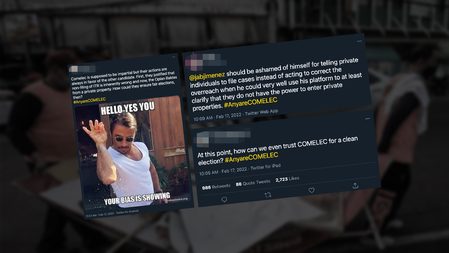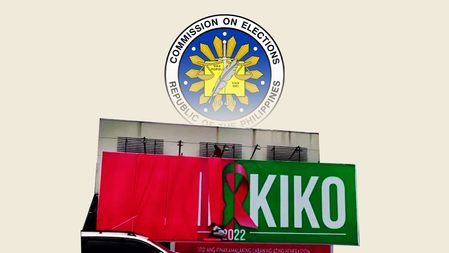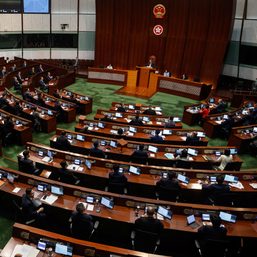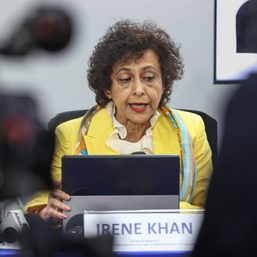SUMMARY
This is AI generated summarization, which may have errors. For context, always refer to the full article.
![[OPINION] ‘Oplan Baklas’ is misguided, unconstitutional](https://www.rappler.com/tachyon/2022/02/tl-oplan-baklas.jpg)
Last week, the Commission on Elections launched “Oplan Baklas,” a blitzkrieg-level campaign that took down “unlawful election campaign materials” within private properties. A public uproar followed the campaign, but the Comelec insists that it has the authority to regulate these materials.
The objections to the Comelec’s campaign are based on the Supreme Court’s 2015 decision in The Diocese of Bacolod v. Commission on Elections.
In that case, the Diocese of Bacolod put up two tarpaulins with the heading “Conscience Vote” and classified candidates for Congress according to their vote on the adoption of Republic Act No. 10354, or the Reproductive Health Law. Those who voted for the passing of the law were classified as comprising “Team Patay,” while those who voted against it form “Team Buhay.”
The Comelec issued a Notice to Remove Campaign Materials addressed to Most Rev. Bishop Vicente M. Navarra, ordering him to removal of tarpaulins for being oversized. Subsequently, the Comelec Law Department issued a letter ordering the immediate removal of the tarpaulins.
The question of the constitutionality of the Comelec’s acts reached the Supreme Court, which was “confronted with the question as to whether the Comelec had any jurisdiction at all with its acts threatening imminent criminal action effectively abridging meaningful political speech.”
The Supreme Court held that the acts of the Comelec in issuing the notice dated February 22, 2013 and letter dated February 27, 2013 were unconstitutional.
The Supreme Court’s decision rested on the following points.
- Comelec does not have the authority to regulate the enjoyment of the right to freedom of expression exercised by a non-candidate.
- Comelec’s notice and letter affect preferred speech. It could result in a “chilling effect” that would affect other citizens who want their voices heard on issues during the elections. Other citizens who wish to express their views regarding the election and other related issues may choose not to, for fear of reprisal or sanction by the Comelec.
- The size of tarpaulins matter. Large tarpaulins are not analogous to time and place that can be regulated by the Comelec. They are fundamentally part of expression protected under Article III, Section 4 of the Constitution.
- The act of the Comelec in seeking to restrain petitioners from posting the tarpaulin in their own private property is an impermissible encroachment on the right to property.
Oplan Baklas clearly defies the Supreme Court ruling, but the Comelec insists that it has authority to regulate speech in private residences is the following passage in the case:
Regulation of election paraphernalia will still be constitutionally valid if it reaches into speech of persons who are not candidates or who do not speak as members of a political party if they are not candidates, only if what is regulated is declarative speech that, taken as a whole, has for its principal object the endorsement of a candidate only.
However, this was not a ruling of the Supreme Court. If anything, this is obiter dicta — an expression of the Court that is not necessary for the resolution of the case. Diocese of Bacolod did not involve speech which “taken as a whole, has for its principal object the endorsement of a candidate only.” As the Supreme Court explained, “The main subject of this case is an alleged constitutional violation: the infringement on speech and the ‘chilling effect’ caused by respondent Comelec’s notice and letter” and not whether the contents of a tarpaulin spilled over from whether social advocacy to “election paraphernalia.”
Even if there is a possibility of regulating speech made within private property, the Supreme Court quickly added that:
The regulation (a) should be provided by law, (b) reasonable, (c) narrowly tailored to meet the objective of enhancing the opportunity of all candidates to be heard and considering the primacy of the guarantee of free expression, and (d) demonstrably the least restrictive means to achieve that object. The regulation must only be with respect to the time, place, and manner of the rendition of the message. In no situation may the speech be prohibited or censored on the basis of its content.
The fact is that the Comelec cannot cite any law that can be the basis of “Oplan Baklas.” According to the Supreme Court, the laws they cited in Diocese of Bacolod (the same laws cited in the present campaign) are inapplicable because “all of these provisions pertain to candidates and political parties.”
What is more appalling with “Oplan Baklas” is that the Comelec does not even send a notice of violation of its rules before it takes down tarpaulins. They knock on doors and tell residents that they are violating the law. Those who are not aware of their rights can be intimidated into giving permission for Comelec to take down their campaign materials.
Comelec’s repeated attempts to justify its campaign as a way to level the playing field is misplaced. This is a mandate that is limited to opportunities for candidates and political parties, not private citizens. This is why the Comelec has the power to determine the size of propaganda materials and the places where they may be posted.
Oplan Baklas suffers from the same defects as Comelec’s earlier effort in the Diocese of Bacolod case. The present operation is far worse now that the Comelec has dispensed with the notice requirement and, if true, claims of trespassing by Comelec personnel or their representatives.
Instead of taking stock of the Supreme Court’s pronouncements regarding the public’s speech and property rights, the Comelec has invigorated its campaign and displayed despite the lack of legal authority to do so. – Rappler.com
Dante Gatmaytan is a professor at the University of the Philippines College of Law where he teaches constitutional law.
Add a comment
How does this make you feel?
![[OPINION] Diocese of Bacolod v. Comelec: Giant tarps, free speech, and democratic disruption](https://www.rappler.com/tachyon/2022/02/comelec-private-property.jpg?fit=449%2C449)


![[WATCH] In The Public Square with John Nery: Preloaded elections?](https://www.rappler.com/tachyon/2023/04/In-the-Public-Square-LS-SQ.jpg?resize=257%2C257&crop=414px%2C0px%2C1080px%2C1080px)
![[Newspoint] 19 million reasons](https://www.rappler.com/tachyon/2022/12/Newspoint-19-million-reasons-December-31-2022.jpg?resize=257%2C257&crop=181px%2C0px%2C900px%2C900px)

![[OPINION] The long revolution: Voices from the ground](https://www.rappler.com/tachyon/2022/06/Long-revolution-June-30-2022.jpg?resize=257%2C257&crop=239px%2C0px%2C720px%2C720px)
![[OPINION] I was called a ‘terrorist supporter’ while observing the Philippine elections](https://www.rappler.com/tachyon/2022/06/RT-poster-blurred.jpeg?resize=257%2C257&crop_strategy=attention)



![[EDITORIAL] Dapat makinig si Marcos kay UN special rapporteur Irene Khan](https://www.rappler.com/tachyon/2024/02/animated-un-marcos-human-rights-elcac-carousel.jpg?resize=257%2C257&crop=327px%2C0px%2C720px%2C720px)

There are no comments yet. Add your comment to start the conversation.